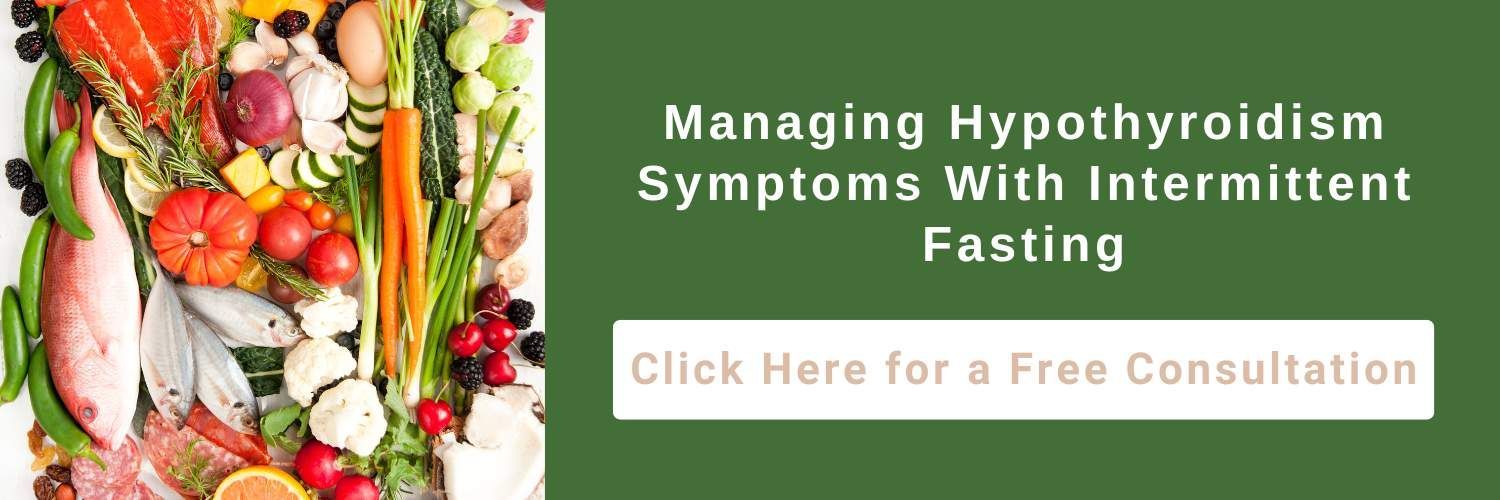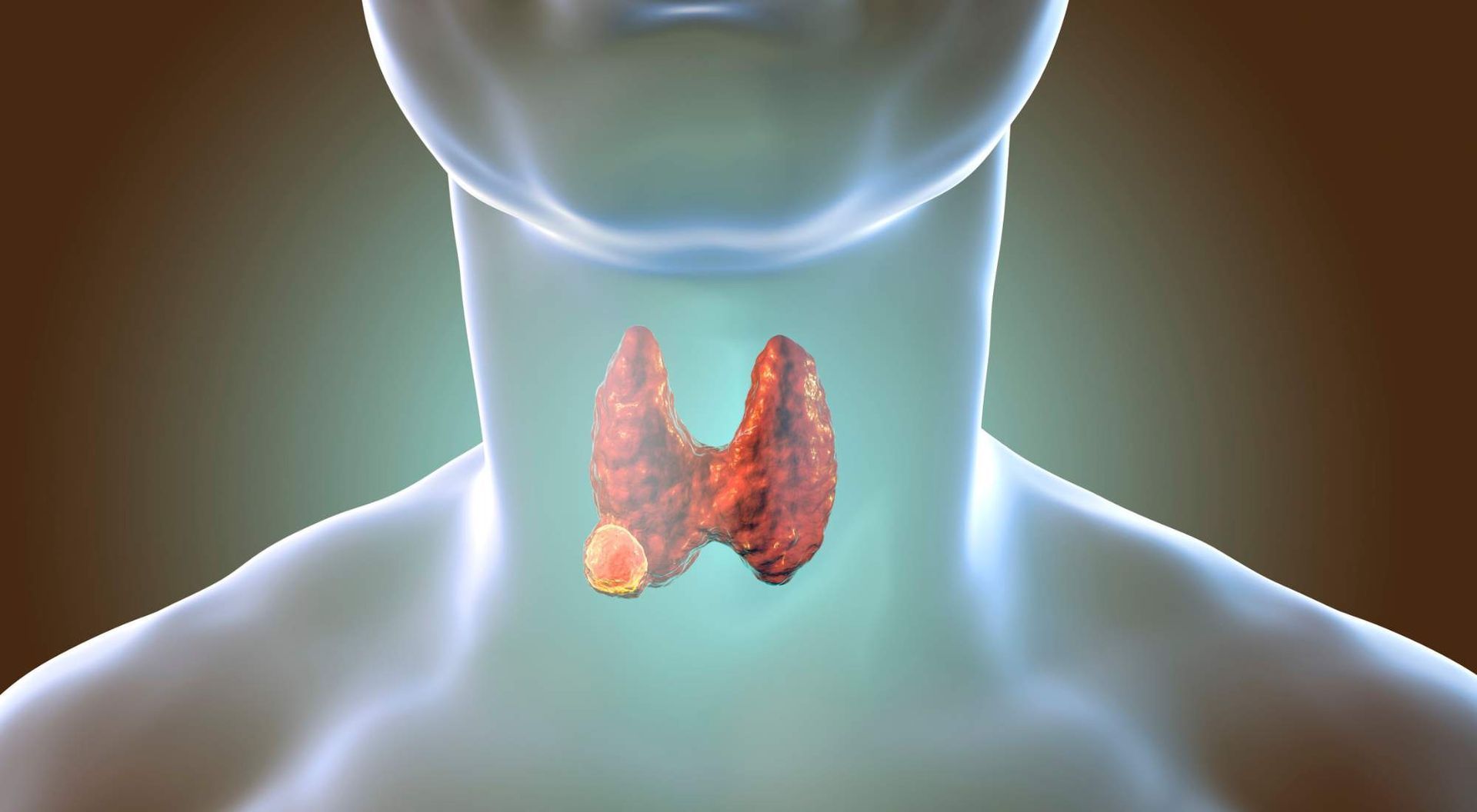Is Intermittent Fasting Good for Hypothyroidism? Benefits, Risks, and Other Considerations
"The content below is not intended to be a substitute for professional medical advice, diagnosis, or treatment. Always seek the advice of your physician or other qualified health provider with any questions you may have regarding a medical condition."
Intermittent fasting is all the rage. But you struggle with thyroid issues and aren’t sure it’s wise to jump aboard this eating plan.
Is intermittent fasting good for hypothyroidism?
Join us as we dive into the benefits and risks of taking part in intermittent fasting with hypothyroidism and get the information you need to make the best decision for your body’s unique needs.
Table of Contents
What Is Intermittent Fasting?
Intermittent fasting (IF) is a dietary practice that follows a cyclical pattern of fasting and eating.
Unlike traditional diets where certain foods are limited or eliminated, IF is characterized by a change in your eating patterns that goes beyond the conventional three meals a day.
This time-bound eating pattern includes various fasting lengths, generally between 16 and 48 hours.
There are a variety of benefits to intermittent fasting that may include:
- Delayed aging
- Boosted metabolism; and
- Weight loss
Methods of Intermittent Fasting
There are many different ways to do intermittent fasting, including:
- Fasting for 12 hours a day – When following this form of intermittent fasting, you adhere to a daily 12-hour fasting window. This is a great option for beginners. Since the fasting window is relatively small, a good deal of the fasting occurs during sleeping hours, and you can consume the same number of calories each day.
- Fasting for 16 hours (16:8) – This is called the Leangains method or 16:8 method. On it, males fast for 16 hours each day and females for 14 hours, leaving an 8-hour eating window. Fasting usually begins around 8 pm, after the evening meal, and eating doesn’t resume again until noon. This form of intermittent fasting may prove helpful for those who have tried the 12-hour fast but didn’t see any benefits.
- Fasting for 2 days a week (5:2) –
This is known as the 5:2 method or Fast method. People following this option eat normal amounts of healthy food for 5 days, then reduce their calorie intake on the remaining 2 days. During the 2 days of fasting, females generally consume 500 calories and males 600 calories.
When following the 5:2 method, people separate their fasting days throughout the week. They may fast on Tuesday and Friday and eat regular meals on the remaining days, with at least 1 non-fasting day between fasting days.
- Fasting on alternating days –
There are a number of variations of this fasting plan, which involves fasting every other day. For some individuals, this means completely avoiding solid foods on fasting days, while others consume up to 500 calories. On non-fasting days, you’re free to eat as much as you want.
Alternate day fasting is considered to be an extreme form of intermittent fasting and is not typically recommended for beginners or those with certain medical conditions. It can also be difficult to maintain this type of fasting long-term.
- Fasting for 24-hour straight each week – Fasting for 1 or 2 days a week is known as the Eat-Stop-Eat diet and involves fasting for 24 hours at a time. Often, people fast from breakfast to breakfast or lunch to lunch. On this plan, you can have water, tea, and other calorie-free drinks throughout the fasting period. People may benefit from trying a 12-hour or 16-hour fast before transitioning to the 24-hour fast.
- The Warrior Diet – This is an extreme form of intermittent fasting. People on the Warrior Diet eat very little food (often just a few servings of raw fruit and vegetables) during a 20-hour fast, then consume a large meal at night. The eating window is generally around 4 hours long

How Does Intermittent Fasting Impact Your Thyroid Hormone Regulation?
The thyroid is a butterfly-shaped gland located in the front of your neck. It secretes the hormones necessary for regulating your metabolism and keeping your body functioning as it should.
When hypothyroidism occurs, the thyroid gland malfunctions, secreting less than the required levels of hormones your body needs to keep working properly.
Hypothyroidism often leaves you feeling tired and sluggish. Since hypothyroidism causes a slowing of your metabolism and decreased energy expenditure, individuals who suffer from it commonly struggle with weight gain.
There are mixed reviews on intermittent fasting and hypothyroidism.
Some studies hold that intermittent fasting negatively impacts thyroid function, lowering T3 and T4 hormone levels, which can worsen hypothyroidism.
However, other research reveals that intermittent fasting can help correct the symptoms of hypothyroidism by facilitating weight loss and improving insulin resistance without impacting thyroid hormones.
Is Intermittent Fasting With Hypothyroidism Safe?
The thyroid gland is your body’s primary organ for metabolism, so any fasting you do directly affects it.
While intermittent fasting may be safe for some people, others may need to avoid it and stick with a regular eating schedule.
If you're considering trying intermittent fasting with hypothyroidism, it's important to first consult your healthcare professional.
At HealthierU we take a holistic approach to hypothyroidism and choose to treat it as naturally as possible through nutrition and lifestyle guidance. Schedule your free consultation to find out more!
5 Possible Benefits of Intermittent Fasting and Hypothyroidism
Intermittent fasting isn’t a one-size-fits-all approach for individuals with hypothyroidism. While some people may experience the benefits of this method, it may not be suitable for others.
The important thing to remember is that while IF will not cure hypothyroidism or Hashimoto’s disease, it could help reduce the severity of symptoms.
#1: May Help With Weight Loss
There are several ways intermittent fasting may help people with hypothyroidism lose weight.
For starters, when you’re doing intermittent fasting, you generally eat fewer meals than you normally do. Unless you eat considerably more food at your meals, you’ll be taking in fewer calories and likely losing pounds.
Intermittent fasting also improves your metabolism by boosting hormone function and increasing the breakdown of body fat to facilitate weight loss as it:
- Lowers insulin levels
- Raises human growth hormone (HGH) levels
- Increases norepinephrine
#2: May Improve Insulin Sensitivity
The thyroid hormones T3 and T4 work together to maintain a balance of glucose homeostasis.
Hypothyroidism may alter this glucose equilibrium and lead to insulin resistance. However, intermittent fasting has been shown to have impressive benefits for insulin resistant individuals.
A 2022
study revealed that 5 weeks of following an intermittent fasting diet significantly improved the insulin sensitivity and blood pressure of male participants suffering from impaired glucose and lipid metabolism.
#3: May Reduce Inflammation
People living with hypothyroidism typically have high inflammatory biomarkers, which indicate an inflammatory process is occurring within the body.
One study found that people with autoimmune disorders who practice Ramadan — a religious holiday that calls for one month of fasting from sun-up to sundown — showed decreased inflammatory biomarkers during and after the holiday.
As a result of the decrease in inflammation, the symptoms of their autoimmune disorder also decreased.
#4: May Promote Gut Microbiome
Your gut microbiome plays a critical role in how your thyroid functions — so any improvement to your gut microbiome will likely have a positive impact on your thyroid.
Research points out that intermittent fasting has a positive impact on both the abundance and the diversity of the gut microbiome, indirectly helping to manage the symptoms of hypothyroidism.
#5: May Reduce Oxidative Stress
Free radicals damage your cells — while antioxidants are hard at work trying to prevent this damage from occurring.
Oxidative stress is the result of having more free radicals than antioxidants within your body.
Oxidative stress is a common issue for those with autoimmune disorders, including hypothyroidism, so keeping it in check as much as possible can lessen symptoms.
Research reveals that intermittent fasting can be instrumental in reducing oxidative stress and its negative effects.
What Are the Risks Associated With Intermittent Fasting and Hypothyroidism?
Intermittent fasting may have different effects on different people. The main concern when it comes to intermittent fasting and hypothyroidism is that it could potentially result in nutritional deficiencies that could exacerbate thyroid symptoms.
Additionally, intermittent fasting is generally not recommended for:
- Women who are pregnant or breastfeeding
- People with type 1 diabetes who take insulin
- People with low blood pressure
- Children and teens
- Those with diabetes, kidney stones, gastroesophageal reflux, or other medical problems
- Individuals who have a history of eating disorders
- People with hypoglycemia (low blood sugar)
Before you decide to give intermittent fasting a try, check in with your primary care practitioner to be sure it’s safe for you
Does Intermittent Fasting Impact Hypothyroidism Medications?
Most people with hypothyroidism or Hashimoto’s disease take thyroid hormone replacement medication to help manage their symptoms and keep their thyroid hormone levels within a normal range.
Since IF can impact TSH levels, the effectiveness of thyroid medication may also be impacted, causing:
- Weight gain
- Fatigue
- Anxiety and/or depression
- Brain fog
- Dry skin
- Hair loss
- Cold intolerance
- Sweating
Always consult with your doctor when engaging in intermittent fasting and make them aware of any new or worsening symptoms.
Practical Tips on Implementing Intermittent Fasting With Hypothyroidism
If you’re ready to give intermittent fasting with hypothyroidism a try, follow these helpful tips:
- Start off with 2–3 meals per day and avoid following a strict timeline or imposing calorie restrictions.
- Plan your times of fasting around your bedtime. For example, fasting two hours before and two hours after bedtime can help you achieve a 12-hour fast.
- Eat well-balanced meals.
- Get your thyroid hormone levels checked periodically as you increase fasting times.
HealthierU: Your Trusted Partner in Promoting Thyroid Health
Ultimately, whether intermittent fasting is good for hypothyroidism depends on several factors including your individual health goals and preferences, and how the intermittent fasting regimen is tailored to your needs.
That’s why consulting with a healthcare professional is so important to determine whether it is safe and appropriate for your hypothyroidism.
Making dietary changes is the best way to return your thyroid to proper working order. If you're searching for natural treatments for hypothyroidism, look no further than HealthierU.
We begin by conducting a Nutrition Response Testing assessment. Once we confirm that hypothyroidism is the cause of your symptoms, you’ll receive a custom-designed program that addresses your distinct needs with a personalized hypothyroidism diet.
Our lifestyle programs are inclusive of tools such as:
- Diet
- Whole food supplementation
- Exercise
Schedule your free consultation today to learn more.





